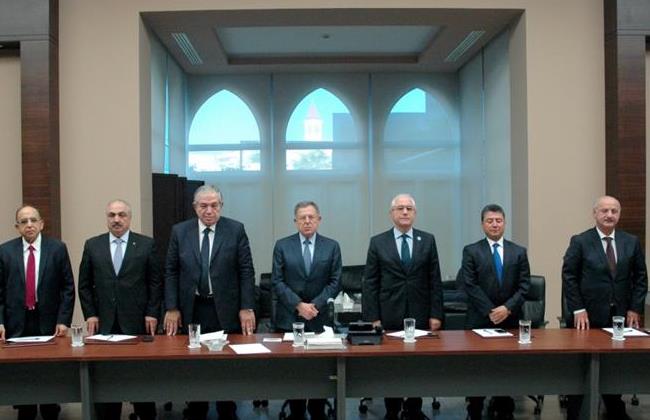Future Bloc ready for compromise with March 8 to break deadlock
Nov. 12, 2014
Hussein Dakroub/he Daily Star
BEIRUT: The parliamentary Future bloc offered Tuesday to reach a compromise with its March 8 rivals over electing “a strong and consensus president,” in the latest attempt to break the deadlock that has left Lebanon with no president for nearly six months.
Meanwhile, the law that extended Parliament’s mandate went into effect Tuesday after it was published in the Official Gazette, clearing the way for lawmakers opposed to the extension to challenge it.
Speaker Nabih Berri defended the extension of Parliament’s term, which expires on Nov. 20, to June 2017, as an essential move to ward off the dangers of a vacuum in the legislative branch of power.
Asked to comment on positive signals he spoke concerning the presidential election, Berri was quoted by visitors as saying: “If I disclose them, they will no longer be positive. Of course, there are signals, consultations and moves serving the issue of the presidential election because Parliament has already been called for electoral sessions. A session is scheduled on Nov. 19.”
Lawmakers last week extended Parliament’s mandate for two years and seven months, citing security concerns and arguing that the move was necessary to avert a vacuum in the legislative body.
The Future bloc, which voted for the extension of Parliament’s term, defended its decision, saying it was the “lesser of two evils” to prevent the country from falling into another vacuum, in addition to the 5-month-old presidential void. It stressed that electing a new president should be Parliament’s top priority.
“The bloc considers that the first and main mission of Parliament after the approval of the extension law is still a swift election of a new president in order to end the vacancy in the top presidency post,” the bloc said in a statement issued after its weekly meeting chaired by former Prime Minister Fouad Siniora.
It blamed Hezbollah and MP Michel Aoun’s parliamentary Change and Reform bloc for the presidential deadlock by thwarting a quorum with their persistent boycott of Parliament sessions to elect a president since April.
“Nevertheless, the bloc sees that this boycotting and negative stance should be reviewed and deeply examined by those who took it in the hope the Lebanese political parties could reach a national compromise over the presidency, resulting in the election of a strong and consensus president who respects the Lebanese Constitution,” the statement said.It added that the strength of a strong president should be manifested in his leadership qualities, as well as in his comprehensive vision of Lebanon’s role in its Arab environment and the world.
“A strong president must enjoy the support of the largest section of the Lebanese and who can work to unite them and boost their solidarity in order to enable Lebanon to confront the accumulating and dangerous problems facing the country,” the statement said.
The bloc stressed that an agreement between the rival factions over the election of a new president is sufficient to create a favorable political climate for the country’s major parties to communicate with each other to tackle divisive issues.
The bloc recalled a recent initiative by former Prime Minister Saad Hariri and the March 14 coalition’s initiative on Sept. 2, both of which called for an agreement with the Hezbollah-led March 8 alliance on a consensus president.
Meanwhile, the law that extended Parliament’s term officially went into effect Tuesday after it was published in the Gazette. Political parties that opposed the law can now file a challenge with the Constitutional Council.
Aoun’s bloc said it would submit a challenge against the extension law to the Constitutional Council during the required period.
“The bloc has decided to file a challenge with the Constitutional Council against the Parliament’s extension law. The bloc’s members have signed the challenge and it will be submitted within the legal deadline,” MP Ibrahim Kanaan said after the bloc’s weekly meeting chaired by Aoun. “The bloc considers the challenge as the only means available to those who want democracy and elections to change the current situation.”
Kanaan added that lawmakers and civil society should support the Constitutional Council in order to guarantee the Lebanese their right to choose, run for the elections and elect.
“The only solution to all debate about a vacuum is by holding [parliamentary] elections. We cannot fill the alleged vacuum except by returning to the people,” he said. “Therefore, the extension [of Parliament’s mandate] is an extension of all crises in which we are living.”
He reiterated Aoun’s proposal for a constitutional amendment to allow the election of a president directly by the people instead of by Parliament.
Last year, the bloc challenged the first extension of Parliament’s mandate, but the Constitutional Council was not able to meet to discuss it for lack of a quorum, caused by the absence of members close to Berri and MP Walid Jumblatt, who backed the extension. The two leaders also backed the new extension, making it uncertain if the council would be able to look into it.




















